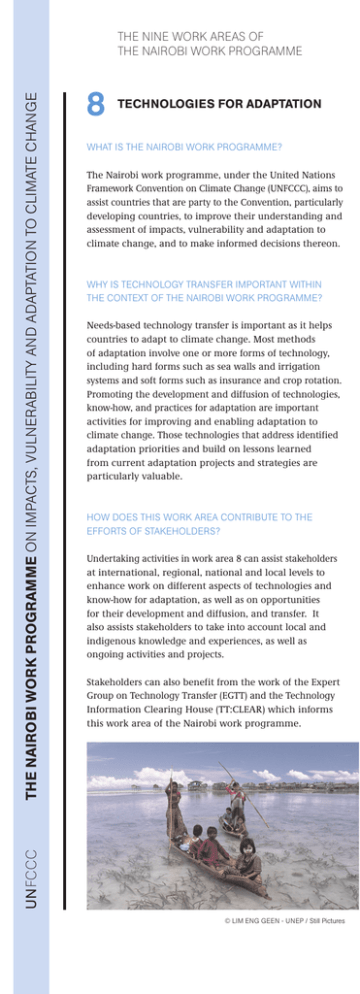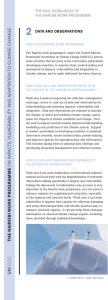thena irob iwork pro grammeon im pa c ts, vu ln e rab ility an
advertisement

8 TECHNOLOGIES FOR ADAPTATION WHAT IS THE NAIROBI WORK PROGRAMME? The Nairobi work programme, under the United Nations Framework Convention on Climate Change (UNFCCC), aims to assist countries that are party to the Convention, particularly developing countries, to improve their understanding and assessment of impacts, vulnerability and adaptation to climate change, and to make informed decisions thereon. WHY IS TECHNOLOGY TRANSFER IMPORTANT WITHIN THE CONTEXT OF THE NAIROBI WORK PROGRAMME? Needs-based technology transfer is important as it helps countries to adapt to climate change. Most methods of adaptation involve one or more forms of technology, including hard forms such as sea walls and irrigation systems and soft forms such as insurance and crop rotation. Promoting the development and diffusion of technologies, know-how, and practices for adaptation are important activities for improving and enabling adaptation to climate change. Those technologies that address identified adaptation priorities and build on lessons learned from current adaptation projects and strategies are particularly valuable. HOW DOES THIS WORK AREA CONTRIBUTE TO THE EFFORTS OF STAKEHOLDERS? Undertaking activities in work area 8 can assist stakeholders at international, regional, national and local levels to enhance work on different aspects of technologies and know-how for adaptation, as well as on opportunities for their development and diffusion, and transfer. It also assists stakeholders to take into account local and indigenous knowledge and experiences, as well as ongoing activities and projects. Stakeholders can also benefit from the work of the Expert Group on Technology Transfer (EGTT) and the Technology Information Clearing House (TT:CLEAR) which informs this work area of the Nairobi work programme. UN FCCC THE NAIROBI WORK PROGRAMME ON IMPACTS, VULNERABILITY AND ADAPTATION TO CLIMATE CHANGE THE NINE WORK AREAS OF THE NAIROBI WORK PROGRAMME © LIM ENG GEEN - UNEP / Still Pictures THE NINE WORK AREAS OF THE NAIROBI WORK PROGRAMME TECHNOLOGIES FOR ADAPTATION WHAT PROGRESS HAS BEEN MADE, AND WHAT UPCOMING ACTIVITIES CAN BE EXPECTED? Progress includes: • Submissions on technologies for adaptation, as part of submissions on adaptation planning and practices by governments and organizations; • A synthesis report based on the information contained in the submissions. Activities mandated during 2008 – 2010 include: • Consideration of outcomes from the Nairobi work programme by the EGTT, under relevant aspects of its work programme for 2008 – 2009; Related activities on technologies for adaptation under the Convention include: Completed activities • A guidebook on preparing technology transfer projects for financing; • A publication on technologies for adaptation; • A technical paper on the application of environmentally sound technologies for adaptation; • A seminar on the development and transfer of environmentally sound technologies for adaptation, in Tobago, Trinidad and Tobago, June 2005; • A workshop on best practices with conducting technology needs assessments, in Bangkok, Thailand, June 2007. Ongoing activities • Update of the handbook for conducting technology needs assessments; • Use of TT:CLEAR and the network of technology centres in order to share technical information on technologies for adaptation, and to build associated capacity to meet the needs for technology information of vulnerable communities and countries. At the beginning of 2009, 9 Action Pledges related to this work area had been received by the secretariat. Action pledges provide an interactive way for Nairobi work programme partners to contribute actions towards the goals and objectives of this work area and the Nairobi work programme. For the latest information on this work area, and accompanying documentation: United Nations Framework Convention on Climate Change (UNFCCC) Secretariat Martin-Luther-King-Straße 8, 53175 Bonn, Germany Telephone (49-228) 815 1000, Telefax (49-228) 815 1999 nwp@unfccc.int, http://unfccc.int/nwp Recycled paper UN FCCC http://unfccc.int/3995.php


